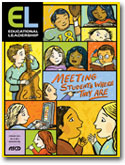When it comes to finding out how students are motivated, what their skill level is, and even what their home circumstances are, a little personal interest goes a very long way. Just the willingness to look beyond a student's classroom performance can turn around a stuck situation, as the opening anecdote to Robyn Jackson's article ("Start Where Your Students Are," p. 6) reveals. Conversely, doing nothing at all to let each student know "I see you as an individual" is rarely neutral; it can have long-lasting consequences.
Understanding What They Value
- Discuss openly with your students the idea of different currencies, both in the sense of rewards and valuable skills. You might even show high school students the first two paragraphs in Jackson's section titled "The Currency of the Classroom." Ask your learners what kind of reward each of them would most be willing to work for and report back to the group. Any surprising findings? How could you incorporate these currencies into your motivational strategies?
- Try out the process Jackson describes with one of your major assignments. Discuss with students the skills this assignment will require and ask for honest feedback on whether most students of their age actually possess these skills (which may yield more honesty than asking if each of them has a certain skill).
- Did this procedure help you discover which skills your students need to do the assignment? How might you differentiate the assignment, given this information?
Understanding What They Know
- Watch the videos showing Marilyn Burns conducting interviews with students about their math work that her article links to: www.mathsolutions.com/placevalue/Cena and www.mathsolutions.com/placevalue/Jonathan. What do you notice about how Burns draws out students' thinking? What is revealed about students' mathematical understandings from their responses?
- What system does your school have for frequent, individualized assessments of reading and math? Do you feel you know "where your students are" in terms of their math understanding as deeply as you know their reading skills? If not, discuss how you might create a system to more frequently examine math abilities, drawing on ideas in Burns's article.
- Read Carol Ann Tomlinson's description of the 7th-grade student who had kept his inability to read a long secret (in her article "One Kid at a Time," p. 12). Can you imagine an equally serious lack of understanding in math going undetected in a student for many years? How would this affect the student as he or she moved through the grades? Have you ever known a student that was hiding a deep-seated skill deficiency in this way; if so, how did you discover this lack?
Understanding What Makes Them Persist
- To learn more about what motivates your students—and just to get to know them—ask several students to talk with you one-on-one about any activity they believe they're good at. You might consider interviewing quieter students about whom you know little. Find out what kind of encouragement keeps them going through hard patches, what they've enjoyed about learning this skill, and what kinds of conditions they find best for learning it.
- Reflect on how you can apply what you now know about how these students learn to help them shine in your class.






